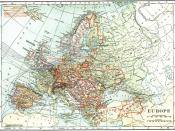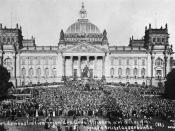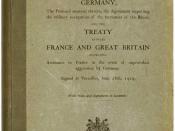How justified are hostile criticisms of the Versailles Treaty?
On the 11th of November 1918 the Kaiser's Germany lay down their weapons on the signing of the armistice agreement. After 5 years of fighting the First World War had come to an end. Germany had lost, and as such assumed all responsibility for its belligerent actions and the outbreak of the conflict. So, out of Germany's "war guilt" was born the 'Paris Peace Conference' and from the cattle trading that ensued over its five-month duration sprung the 'Versailles treaty' professing the manifesto for German reparations, which in the years to come were to cripple the newly founded Weimar Republic. Many countries, statesmen and certainly not least the population of Germany criticised the agreement for it's unfair terms. Not only this but it is still widely regarded as a major facet in any discussion of direct causes for the Second World War.
But is this hostility in contemporary history unfounded or can the 'Versailles Treaty' decently be called a mistake of what was realised to be biblical proportions?
As the historian Sally Marks wrote, "the net effect of World War One and the Peace Treaty was the effective enhancement of Germany's relative strength in Europe." Suggesting that the treaty had backfired on the victorious allies. Adopted by other historians as well, this line of argument is one not without question. It is clear that before the rise of Hitler it certainly did not "enhance" Germany in any sense of the word. Prime examples of quite the opposite are numerous. Explicitly, vast financial debts and loss of land all of which were bought about directly by the terms of the treaty. However, credibility can still be attributed to this somewhat damning thesis of Marks'. In the longer...


